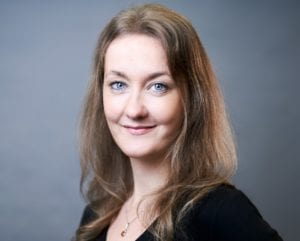Prof. Dr. Dr. Frauke Rostalski
Professor of Law, University of Cologne
Artificial intelligence and the law
Frauke Rostalski is a professor of law and deals with legal issues relating to artificial intelligence. In addition to her work at the University of Cologne, she also contributes her expertise to the German Ethics Council.

© University of Cologne
What makes the topic of artificial intelligence so exciting for you as a legal scholar?
Artificial intelligence is leading to entirely new problems and opportunities on both »sides« of the law: If a vehicle controlled by AI causes an accident, the question of legal responsibility arises. It is therefore a matter of applying the law to AI. But alongside this, AI can also help apply the law, for example by analyzing legal texts in natural language and tracing decision-making patterns. It may even be possible to fully automate the application of the law for some cases. This is not possible with »classical« algorithms.
As part of KI.NRW, you are working with other experts on the certification of artificial intelligence. Why is certification so important for you and who can benefit from it?
For most people, AI is a term straight out of science fiction. I can roughly imagine how my car’s brakes work, even if I couldn’t fix them. That’s why I can judge whether I can rely on it. Artificial intelligence is a black box for most people because without expert knowledge, it’s impossible to see what exactly the algorithm does and how it works. If people want to trust AI the same way they trust their car’s brakes, they have to rely on someone else’s judgment. That’s the reason why certification is so important: whether if I am a consumer, an entrepreneur or a government agency, the certification can help to identify if an AI application is trustworthy.
If technical autonomous systems become more and more »intelligent« and increasingly populate our living environment, will there also be a need at some point for something like »special legal status for robots« in the sense of an »electronic person«?
One has to differentiate precisely here. The term »electronic person« suggests that AI is in some way placed on an equal footing with humans, i.e. that it is protected by its own rights, for example. However, this is not what is meant and, in my view, would not be permissible or meaningful. The »electronic person« referred to in the report to the EU Commission concerns the question of liability: above a certain level of autonomy, even developers can no longer predict exactly how artificial intelligence will behave. If we as a society decide to use these systems anyway for the sake of their economic or other benefits, there must be compensation for the people at risk as a result. The »electronic person« then represents a liability mass from which damages caused by the AI can be compensated – most comparable to liability insurance for cars.
In the context of the KI.NRW Annual Conference 2020, Prof. Dr. Dr. Rostalski presented the topic of certification of artificial intelligence in-depth in her lecture »Value-oriented AI design«. You can watch the lecture here.
Prof. Dr. Dr. Frauke Rostalski holds the Chair of Criminal Law, Criminal Procedure, Philosophy of Law and Comparative Law at the University of Cologne. She studied law at the Philipps University of Marburg and completed her doctorate there from 2009 to 2011 on the topic »Gesinnung und Straftat. Besinnung auf ein rechtsstaatliches Strafrecht«. Following her second state law examination in 2013, she spent research periods at Nanjing University (China) and Seoul University (Korea). For her habilitation thesis »Der Tatbegriff im Strafrecht«, Frauke Rostalski received funding from the Daimler and Benz Foundation, the German Research Foundation (»Eigene Stelle«), and the Fazit Foundation. From 2016 to 2017, she spent a research stay at the State University of New York, Buffalo (NY, USA), funded by fellowships from the Volkswagen Foundation, the DAAD, and the Marie Curie Program of the European Union. In 2017, she was awarded the venia legendi for the subjects Criminal Law, Criminal Procedure Law, Philosophy of Law, Economic Criminal Law, Medical Criminal Law and Comparative Law by the Philipps-Universität Marburg. In the same year, she received her doctorate in philosophy on the topic of »The Naturalness Argument in Biotechnological Measures« from the Friedrich Schiller University of Jena. Frauke Rostalski is a member of several scientific associations such as the working group »Responsibility: Artificial Intelligence and Machine Learning« at the Berlin-Brandenburg Academy of Sciences. At the University of Cologne, she founded the interdisciplinary research unit on »Law and Ethics of Digital Transformation«. Since January 2019, she has been responsible for the area of »law« in the certification project KI.NRW and advises the Ethics Advisory Board of the state of North Rhine-Westphalia on issues related to digitalization. She has been a member of the German Ethics Council since April 2020. Frauke Rostalski researches and publishes on the following topics: Foundations of Criminal Law and Criminal Procedure Law; Philosophy of Law; Economic Criminal Law; Boundary Issues between Medicine, Law and Ethics; Challenges of Digitalization for Law and Morality. As an expert in the field of the legal and ethical implications of digitalization, she is a sought-after speaker both nationally and internationally.